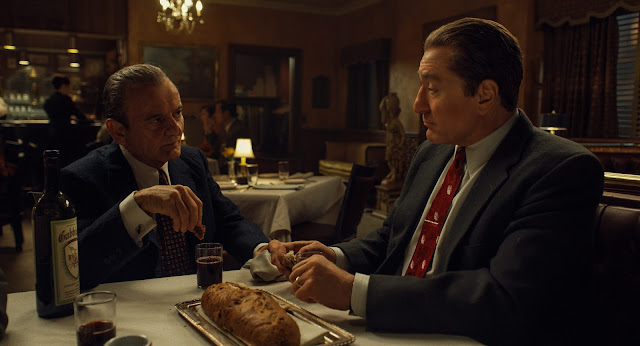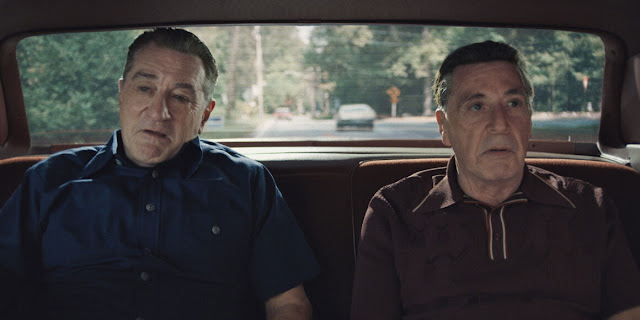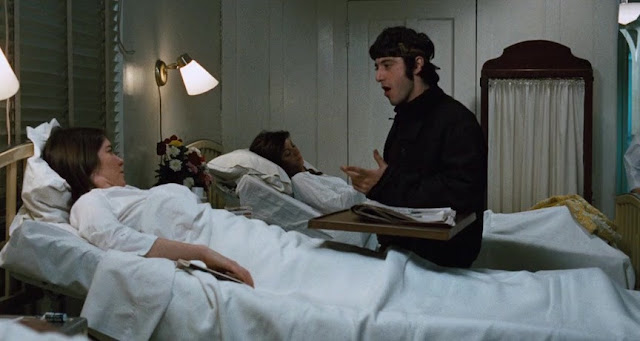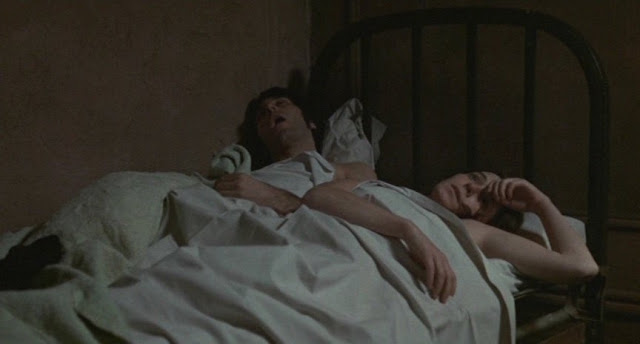“I heard you paint houses.”
“Yes, I do. I also do
my own carpentry.”
A friend of mine once said that Martin Scorsese makes the
same movie over and over, and I had to do everything in my power to avoid
picking up a nice-looking pen off a bar and kick-stabbing him in the throat until
he was a bloody mess on the ground. (I’m kidding.) (Or am I?) In a really
superficial way, one could believe this was a sound observation: it’s not just
because the most well-known portion of Scorsese’s filmography has taken place
in the world of the Italian mafia (though relegated to only four films,
including The Irishman), with a
single detour into the world of Irish crime in The Departed, but also
because Scorsese’s own style and techniques carry over from film to film,
giving them an almost brand-like feeling. There’s the first-person narration,
the “crime is awesome” montages, the Rolling Stones soundtrack, the gorgeous
spot-lighting, the frenzied smash-cut editing, and an ensemble of familiar
faces like Robert De Niro, Joe Pesci, Harvey Keitel, the somewhat obscure Frank
Vincent, and pretty much the entire supporting cast of The Sopranos. “I liked it the first time I saw it…when it was
called Goodfellas,” a mid-90s SNL oddity known as David Spade once
said about Casino. Gestating since
at least 2008, The Irishman was predictably lobbed from the start with the same
kind of shallow proclamations that Scorsese and De Niro were going to make yet another version of Goodfellas, even before a single frame had been shot. Once the film
finally made its long-awaited debut on Netflix, twelve years after it was first
announced, the camp was still split on what kind of film The Irishman was vying
to be. Was it just another Goodfellas
riff, or was it something decidedly different?
In case you haven’t deduced it for yourself during one of my
typically elongated lead-ins, The
Irishman is, indeed, something decidedly different. Is it about the mafia?
Yes, it is. Does it involve a fair number of Goodfellas et al. cast members? Yes, it does. But where Goodfellas was a Scarface-ish allegory about opulence, power, and the eventual fall
from grace, The Irishman is an Unforgiven-like examination of a
misspent life immersed in dirty tasks for dirty people at the expense of one
man’s family. That the film is headlined by an aging De Niro wasn’t just the result of the film being in
pre-production for a very, very long time, but it’s also the point of The Irishman entirely. It’s about sin,
regret, mortality, and legacy. And yes, De Niro, as one tends to do, has aged.
For lack of a more respectful word, De Niro is now an old man. His elderliness
has crept into his take on Frank Sheeran that both benefits and handicaps his
performance, guiding him in his role of a soft-spoken, somewhat slowwitted boob
eager to please his masters like a loyal dog, but which is also occasionally at
odds with the visual technology being employed to shave decades off his real
age. In a way, De Niro’s appearance and performance sum up the experience of The Irishman as a whole – still
engaging, still artfully made by one of cinema’s remaining old-school masters,
but maybe, perhaps, a couple decades too late.
Based on prosecutor Charles Brandt’s “non-fiction” book I Heard You Paint Houses (I say
“non-fiction” because it was based entirely on Sheeran’s version of events,
which many have claimed to be dubious), The
Irishman is a sprawling epic where genuine history and possible artifice
intermingle in ways that, regardless of the film’s ultimate dance with reality,
is still a compelling story. The
Irishman weaves a complex narrative of many characters, many conflicts, and
many intersecting timelines. With a running time of three and a half hours,
that’s not surprising. What is
surprising is how quickly those three and a half hours go by. Surrounding the
main cast of De Niro’s hired hitman Frank Sheeran, Joe Pesci’s mob boss Russell Bufalino, and Al
Pacino’s Jimmy Hoffa is an extensive ensemble cast who bring to life many of
Philadelphia’s crime figures, including infamous mob boss Angelo Bruno (Harvey
Keitel), Felix “Skinny Razor” DiTullio (Bobby Canavale, sporting a “rescinding”
hairline), and an unexpectedly excellent Ray Romano as attorney Bill Bufalino.
(In a weird bit of my family’s history, The
Irishman makes brief mention of crime figure Frank Sindone, who
helped plan the hit on Bruno and was later found dead in an alley with three
bullets in his head. My Philadelphia-born father once unknowingly shared a car ride with
Sindone and others from the neighborhood and later described him as “pretty
fuckin’ intense.” My father also had a cousin [for whom things didn’t end well]
who worked at the Latin Casino, which is featured during Sheeran’s
“Appreciation Night” after he becomes President of the teamsters’ local union
326. I keep telling him he needs to write his own book about 1970s Philly because
he’s seen some shit.)
In a way, even though any
film should consider a comparison to Goodfellas
extremely flattering, The Irishman works
much better as its own beast. The gliding cameras, the eclectic oldies
soundtrack, the voiceover: sure, those things are all present and accounted for
– but The Irishman is measured,
calm, patient, and mature. It’s a film that stands on its own, of course, but
it’s also an acknowledgement of the long and very successful careers of those
who made it. It’s Scorsese touching base with audiences and gently reminding
them that his on-screen mafia tales are what’s attracted the most eyes,
garnered his best critical notices, and punctured pop culture in ways that many
of his other films didn't. And let’s face it: Scorsese wouldn’t have
gone back to this same well so many times if he, himself, wasn’t so fascinated
with a life of crime. What began on a small scale in something like 1973’s Mean Streets, made with a
guerilla-style, low-budget scrappiness, has culminated forty-five years later
with The Irishman, a two
hundred-million-dollar epic that likely hit more eyeballs in its first day on
Netflix than did his 2016 Jesuit priest drama Silence during its entire theatrical run. Indeed, Scorsese trots
out many of his trademarks, though the occasionally abrupt editing by longtime
collaborator Thelma Schoonmaker is much more restrained, in keeping with The Irishman’s slower pace. Though
Scorsese still falls back on voice-over from a few characters, now they directly
address the camera like they’re confessing their sins to us, the audience. As
for his new bag of tricks? Yes, the controversial de-aging technology, which
landed with audiences in extremely polarizing ways. “It looked great!” versus
“It looked terrible!” flooded reviews and talk-backs. Snotty backseat drivers
uploaded their own “deep fake” videos to Youtube to show how it could’ve been
done cheaper and with better results. But here’s the thing: the de-aging
technology itself actually looks
fantastic, removing the deep creases and weathered appearances of our charming
older men. The problem, however, is that those brand-new youthful faces are
then pasted over their still-old dumpy bodies, and the additional decision to
have De Niro wear blue contact lenses to “look Irish” (even though he played an
Irishman in Goodfellas and wore no
such thing) only does a disservice to the millions of dollars spent on those
faces. Despite what the actors and choreographers tried, old men can only move
like old men, and when it comes time for De Niro to knock down and kick-stomp
the local grocery store owner, he kicks like an old man, and it’s hard not to
notice.
Frank “The Irishman” Sheeran is an atypical performance for
the De Niro we’ve come to anticipate from a Scorsese film, but perfectly
appropriate and in line with not only the real Frank Sheeran, but the work De
Niro has been doing as an actor since the early 2000s. Throughout his collaborations
with Scorsese, or during the “nod” roles he’d play after the fact that painted
him as a mob boss of sorts, De Niro was always in a position where he wielded
power and influence (or in the case of Brian De Palma’s The Untouchables, baseball bats). Audiences have spent the last
several decades affiliating themselves with De Niro the boss, from Goodfellas’ Jimmy Conway to Casino’s Sam Rothstein. This time,
however, he’s the bag man, the hired gun, the administrative assistant who just
so happens to steal and kill. Hell, he’s not even comfortable pulling the car
over unless someone else says it's okay. “I was a working guy,” Sheeran
says early on before he made his way into the crime world, but even after that,
he was still a working guy – it’s
just that the things he did are what
changed. Sheeran, as presented, is a pathetic figure, only finding worth in the
eyes of the crime figures who want him around while barely making time for his
own family. One gets the impression that De Niro, for the first time in his
life, is actually wanted around, and
it renders him a purposely toothless presence, putting him into certain
situations to perform acts he doesn’t have the guts to refuse. When Sheeran
retreats to an empty bedroom to make a private phone call he’s been dreading,
it’s the most pathetic De Niro has made one of his characters look in his fifty
years of acting – even more than his famous scene in Taxi Driver where he’s being consistently rebuffed over the phone
by Cybil Shephard’s Betsy, whom, after a disastrous date, wants nothing to do
with him. “What kind of man makes a phone call like that?” Sheeran later muses
during one of the film’s final scenes. De Niro, the boss who stomped on Billy
Bats’ skull, who tore through the pimp underworld to save a young girl, who
refused to be knocked down by Sugar Ray Robinson, has become a spineless,
subservient slave, and he was the one
who let it happen.
Sharing the screen with De Niro for the first time since
1995’s Casino is Joe Pesci, who
makes a welcome return to Scorsese and co.’s world, his last high-profile
project being his good friend De Niro’s 2006 directorial project, The Good Shepherd. Let me just say
this: he was incredibly missed, and he offers up the film’s best performance.
Gone are the days of the volatile Tommy DeVito and Nicky Santoro. Though his
Russell Bufalino is “the boss,” he exacts that title almost manipulatively in
soft-spoken but firm tones. He never, once, goes big, mirroring De Niro’s more
neutered approach, and it’s quite honestly one of the best performances in his
career. But don’t worry! Al Pacino is definitely
ready to take on everyone’s yelling for them. Speaking of, though Pacino offers
a fine performance as Jimmy Hoffa, he seems to be playing just another version
of Pacino instead of the real man; if we must compare, it doesn’t come close to
Jack Nicholson’s take from 1992’s Hoffa,
directed by Danny Devito.
Though The Irishman is about ugly things, it doesn’t glamourize them in the same ways as Goodfellas and Casino. In some respects, The Irishman feels like the thematic third part of a trilogy that includes those two titles. It’s the end result of long lives spent creating and depicting stories of crime, but also of the real lives that inspired those stories, the toll taken from living on the wrong side of the law, and that no matter what one’s calling in life may be, eventually, everything comes to an end. And if, at the end of your life, you’re haggling with the salesman over the price of your own coffin – when you’re the one making the arrangements for your funeral because your family won’t do it – you know that’s a life that was lived selfishly, cruelly, and deeply alone.
As much as I loved to see the likes of De Niro, Pacino, Pesci, and Keitel sharing the screen together again, it pains me to say that The Irishman could’ve been a flawless endeavor if our primary trio of actors had been relegated to playing the last two time periods depicted in the film, while falling back on younger actors for the previous two. (Hey! Like they did in Goodfellas!) Having said that, The Irishman is still top-tier filmmaking for everyone involved and showcases a director who, despite his age, has no intent on slowing down.
[Reprinted from Daily Grindhouse.]
















